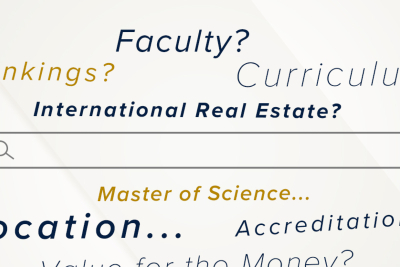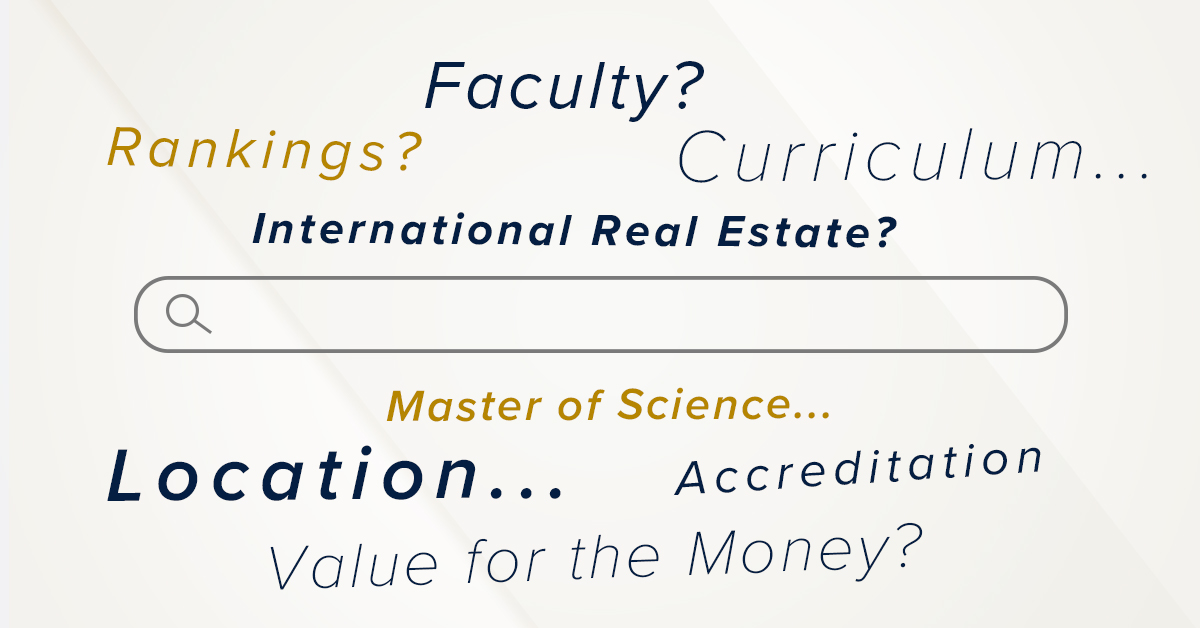When looking for a master's degree in real estate program, the options are plentiful. You can earn a Master of Science in Real Estate, Real Estate Development, International Real Estate, an MBA with a specialization in real estate, or even urban planning.
It can be overwhelming when deciding what program to invest your money in, so we've broken it down into six easy categories to consider when doing your research.
1. Accreditation
Accreditation should always be the first thing to check for when searching for your ideal graduate program. Why is accreditation so important? It means the program, including faculty, passes very rigorous quality standards. The program is guaranteed to teach you what you need to know to be successful in your career.
It also means it will continually be evaluated to make sure it maintains that excellence and stays relevant in today's fast-changing world.
Most real estate programs are housed in a college of business. For these colleges, the highest accreditation you can have is the AACSB accreditation. AACSB International has been around since 1916 and specializes in accrediting business programs. It is a highly-respected organization, and earning its accreditation is no small feat — AACSB accredits the top 5 percent of business schools worldwide.
There are other accreditation bodies that are more industry or role-specific. For example, FIU’s Master of Science in International Real Estate is also accredited by RICS. RICS is a worldwide organization for professionals in property, land, construction and related environmental issues. It works with and accredits institutions that develop appraisers for the real estate industry.
2. Curriculum
Each degree is unique. Therefore, it's crucial to assess the curriculum of programs you are interested in. You should be able to find a list of courses required to graduate and accompanying electives from a university's website. If not, reach out to a recruitment manager for a list.
Make sure the courses cover topics that interest you or will help you achieve your career goals. If you’re more interested in design and development, make sure it’s covered. If you want to learn about investment and management, you should look for a curriculum that includes classes in market analysis, valuation and even law.
3. Faculty
As important as curriculum, is who is teaching it. It's imperative to learn from professionals within the industry who will bring valuable real-life context to their teachings that you otherwise would not learn from a textbook.
- Are the faculty members of your program involved in the industry?
- How many years of experience do they have?
- Are they involved in research?
- What companies have they worked for or, if they are entrepreneurs, what projects have they been a part of?
This information is not always readily available and involves a bit of research on a prospective student's part. Still, it is worth the time to learn if your professors are qualified to be instructing you.
4. Rankings
There has been considerable debate about how to measure the effectiveness of graduate real estate programs, and because of that, there are currently no formal rankings. Prospective students must do some research on their own and evaluate a program’s curriculum, faculty, and other essentials.
We do recommend students to take into account various real estate case competitions. Although not a replacement for formal rankings, in its absence, these are useful in determining which universities are successfully preparing their students for real-life scenarios.
Universities often send a team of current real estate students to complete these challenges that put a wide variety of industry-specific skills to the test. Coming out on top helps give others an idea about how well a university may be doing.
Top competitions to look into are the ULI Hines Student Competition, ARGUS Software University Challenge, and the National Real Estate Challenge.
The National ARGUS Software University Challenge
The ARGUS Software’s University Challenge has become a staple competition among graduate real estate programs.
For over 30 years, ARGUS has created products geared towards the commercial real estate industry, focusing on investment, management and development. The firm provides a variety of tools and programs that collect, track and analyze data to help owners, developers, asset managers, financial institutions, brokerages, REITs and service providers.
In 2009, ARGUS hosted the inaugural University Challenge. ARGUS invited top real estate programs to form teams amongst their students to compete with other universities around the U.S. The challenge is to bring aspiring real estate professionals together to conduct a real-life investment analysis and create a business plan based on the results from ARGUS models.
The University Challenge allows students to compete for cash prizes totaling $50,000 while applying their real estate knowledge and ARGUS skills in a case study on fictitious investment scenarios. This competition provides students with much needed hands-on experience and allows them to develop their skills by practicing with the software.
Throughout the past decade, ARGUS has welcomed close to 50 universities and 300 students to the competition from the top real estate programs.
FIU’s Master of Science in International Real Estate (MSIRE) is a frequent competitor, bringing home to Miami top-three titles and an honorable mention. FIU teams have competed and beaten teams from other graduate real estate programs, including Cornell University, Emory University, NYU and UPenn’s Wharton School.
5. Location, location, location
Students interested in learning about real estate should also attend programs in cities where there is accelerated real estate growth and an active real estate market, which can be beneficial for many reasons.
Being surrounded by a community that's active in the industry helps grow not only your network, but also your job opportunities. Your professors and the advisory board members are all likely to also be involved in the community, and that could lead to property tours or some form of experiential learning. Being able to drive down the street and see projects being developed is a significant plus.
6. Value for the money
Earning a master’s degree also means having a monetary expense. There are programs that add more value to earning a real estate graduate education besides their curriculum.
Graduate programs can offer memberships to important associations, career placement services, internships, specialized certifications, or invitations to conferences.
One of the more notable bonuses of some programs is fast-tracking designations or licenses, which means that the classes you're taking can earn you credit to cover the ones needed to complete, for example, a state licensing course that's required. This added value saves students thousands of dollars and a great deal of time.
Bottom line: Do your due diligence and choose the best master’s in real estate
Whether you have a program in mind already or you're still searching, be sure to do your due diligence. The more you learn about your program and its accreditation, curriculum, faculty, rankings, location and other extras, the more you'll be able to capitalize on them and get the most out of your graduate education.
If you’re interested in pursuing a Master of Science in International Real Estate, join us for an information session about our online and in-person programs.


